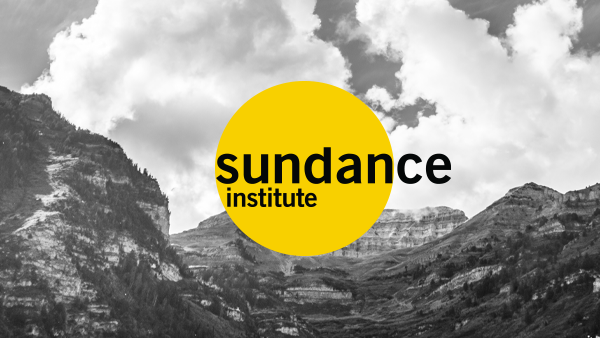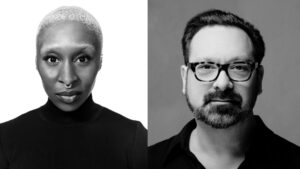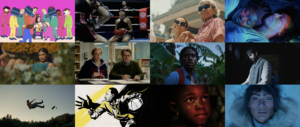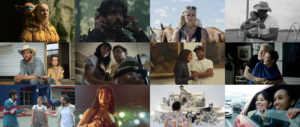Greg Harrison
Last month, Sundance Institute creative advisor Greg Harrison attended the Middle East Screenwriters Lab in search of “another round of magic.” In the wake of the 10-day desert retreat, he shared his newfound insight on the screenwriting process and the curious absence of writing at the lab.
In the dead of night, the in-flight Mecca compass rotated left as the plane banked south somewhere over the Netherlands. Surrounding me, silhouetted by reading lights, a handful of Middle Eastern passengers quietly prayed as a movie flickered on screens above us: An Arab action-comedy satirizing James Bond in the style of The Three Stooges.
To say that my first ever trip to the Middle East felt surreal is an understatement. Only a week ago I was staring at my laptop in a Silverlake coffeehouse, struggling with the outline for a new script I’m writing, trying to remember exactly why I was born.
Luckily, an email from Sundance Institute’s Alesia Weston offered me an opportunity to trade my existential desert for a real one: “I wanted to reach out with a really random invitation in case you were free or interested…” she began, asking if I would be available as an Advisor for the 10-day Middle East Screenwriters Lab held at a world-renowned eco-resort in the middle of the Jordanian desert. The short answer—after my wife agreed to 10 days of solo parenting in exchange for untold spa weekends—was, “Sign me up!”
I wasn’t exactly new to the allure of the Sundance Institute Labs. I’d been a fellow at the Utah labs in 2006, and consider that experience a crucial leap forward for me as a writer. So naturally I was excited to have another round of the magic, especially as an advisor. The idea of jumping into a new culture with filmmakers from all over the world sounded exactly like what I needed. Or was at least the most inventive form of procrastination I had yet conceived.
With an 18-hour flight, a 10-hour time difference, and massive sleep deprivation, my memory of arriving in Amman is a fragmented blur: Gaba, our preeminent local guide from the Royal Film Commission, who greeted us with his beatific smile; the hundreds of Arabic campaign posters in downtown Amman (a big parliamentary election was only weeks away); Roman ruins interspersed amid mosques; the cacophony of Arab prayer calls mixed with street vendors hawking everything from produce to freshly pirated DVDs (yes, all our movies were for sale).

It took a few days to acclimate to the time change and for the rest of the Fellows and Advisors to arrive, but then we were off in a tour bus headed for the desert. The route took us along the Dead Sea, stopping at a Bedouin town to transfer to pickup trucks for the 40-minute ride on unpaved roads to the Dana Biosphere Reserve. Finally, the Feynan resort appeared like an oasis and the staff greeted us with homemade tea, cool towels, and the local camel, Two Reds. It felt like the most exotic vacation I could imagine.
But of course, we were really in the desert to work. The daily rhythm of the week went like this: Breakfast. Group Advisor meeting for us to discuss the status of the scripts. Three-hour one-on-one meetings with the Fellows. Lunch. More one-on-ones. Dinner. Screening. Hanging out on the roof watching shooting stars. Sleep. Get up and do it again. Okay, maybe “work” is too strong a word.
One of the aspects of the Lab that often surprises Fellows is that there’s no writing. I remember going to Utah as a Fellow and thinking I’d have a new draft by the end of the week. But what I discovered then, and now as an Advisor feel is the genius of the Lab, is that the focus is on a higher level of script discussion, namely: “What is it about?” Sure, we also talk about writing dialogue, editing scenes, thinking visually, but these are just aspects of the craft. The more I write, the more I see how the actual writing of the script is only a step in a process that calls you to continually ask questions about how you see the world and what truths about the human experience you are trying to express.
These kinds of discussions were the most satisfying moments in the Lab for me. Over the course of days, I saw Fellows discovering and at times eloquently articulating what was really driving them to write their stories, regardless how far along their actual screenplays were. Uncovering these sometimes hidden answers is like discovering an organizing force—a magnet—that you can drop into the middle of the draft and then watch as the pieces align and shift and are even repelled by its presence. It can allow the writer to dive back into the ground level of the rewrite with more clarity about what should stay and what should go. Not that that clarity comes immediately or easily. It can be a harrowing time for the fellows to be asked to confront the deeper questions of their work, and to face the gap between what they intended to say and what they’ve been able to express on the page thus far.

Luckily, there was a community of writers and mentors to support them throughout the process, and I can attest to the camaraderie and sheer buzz that developed among us over the week: Suha’s and Basil’s contagious laughter while telling each other inside jokes in Arabic; an inspiring screening of Motorcycle Diaries on the roof beneath the haze of the Milky Way; Wash and Bill bringing the rock with acoustic covers of the Beatles, with Mohammed backing them up on Arabic drum; and our intrepid artistic director Ziad, whose passion when discussing just about anything was utterly infectious.
But perhaps the deepest bond formed on our final night when Mohannad and Reem from The Royal Film Commission unveiled…International Video Karaoke, complete with hundreds of Western and Arabic songs. And so, in the haze of shisha smoke (apple-flavored tobacco, people!) and red wine, we bid goodbye to the desert with half-remembered 80s pop songs (yours truly belting out Bon Jovi’s “Living on a Prayer”) and what was giddily described to me by Karim, one of our Fellows, as “the cheapest, lowest class Egyptian pop music available in the world.” If this was not the zenith of cultural exchange, then I do not know what is.
I’ve often described the labs to friends as summer camp for film, with a similar sense of intensity, bonding, and finally melancholy as it winds to a close. As any Advisor or Fellow will tell you, it’s difficult to say goodbye to such an immersive experience. And yet I was happy to emerge from the Lab creatively refreshed, inspired not only by the other advisors whose work I’ve admired, but also by the energy and drive of the Fellows embarking on their first feature.
Staying in touch with that excitement, idealism—and yes, even a kind of naïveté—is critical to willing a project to life, regardless how long you’ve been making films. And I for one feel grateful to have had the opportunity to dip into that well one more time.
Shukran, Sundance!




